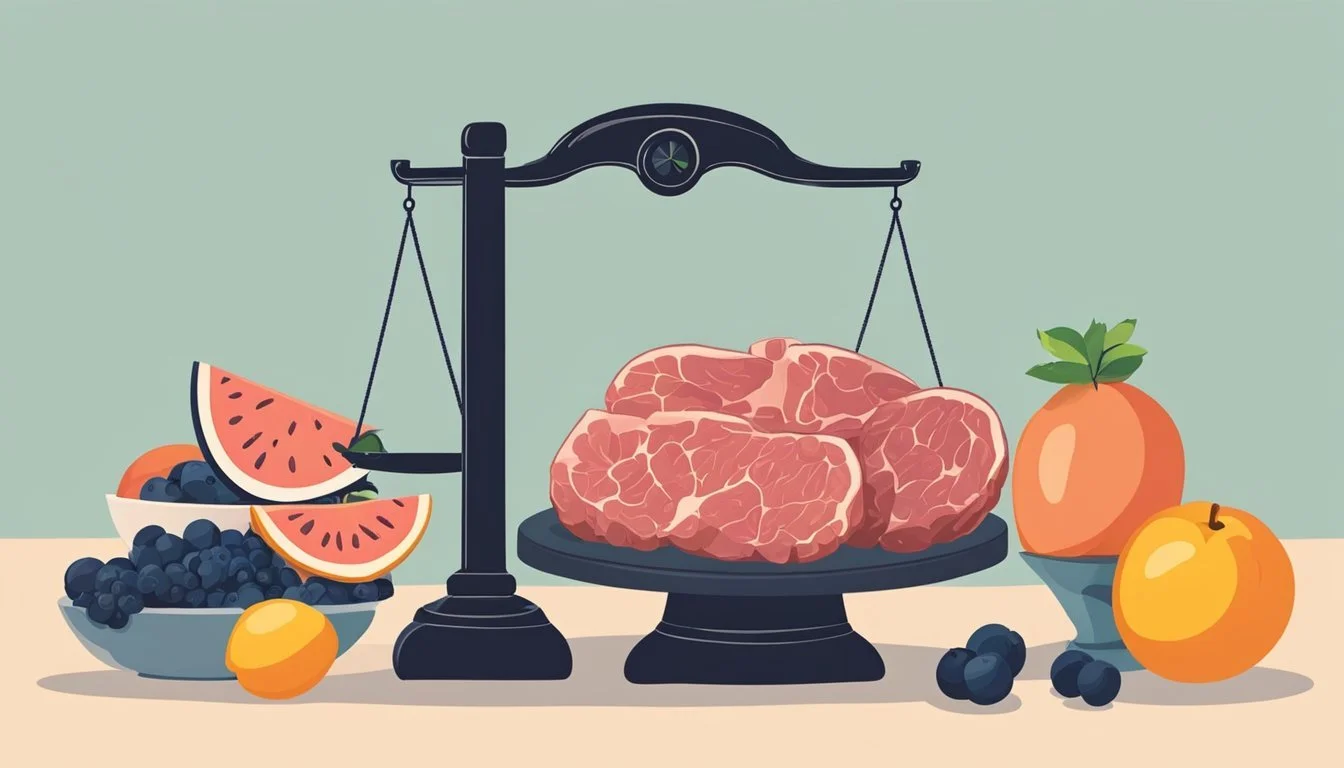Carnivore Diet vs. The Shangri-La Diet
Exploring the Mental Aspects of Hunger and Fullness
The exploration of dietary patterns is driven by the pursuit of optimal health and wellbeing. The Carnivore Diet and The Shangri-La Diet represent two disparate approaches to nutrition and weight management rooted in distinct concepts of eating psychology and satiety. The Carnivore Diet, a regime that consists exclusively of animal products, hinges on the premise that human physiology is well-adapted to a high-protein, zero-carb intake, aiming for purported health benefits that include weight loss and improved metabolic markers. Its advocates point towards a simpler, more ancestral eating style, suggesting that the absence of plant-based foods could lead to better overall health.
Conversely, The Shangri-La Diet, which is less about specific foods and more about the sensory experience of eating, presents an unconventional method to address satiety and suppress appetite. Developed by psychologist Seth Roberts, this diet introduces flavorless calories between meals, such as light olive oil or sugar water, suggesting that this can recalibrate the body's hunger cues, leading to reduced calorie intake and eventual weight loss. The science behind this method relies on the psychological conditioning of the sense of taste and its impact on eating habits.
Both diets come with their respective health benefits and risks, as noted by experts in nutrition and dietetics. The Carnivore Diet, while eliminating processed foods and sugars—a positive step towards health—poses concerns regarding the lack of dietary fiber and potential nutrient deficiencies. The Shangri-La Diet's focus on appetite suppression through flavorless food consumption raises questions about long-term efficacy and balance in one's diet. Understanding the underlying science of these diets is crucial for individuals considering them, as the implications on overall health are influenced by various factors such as pre-existing conditions, lifestyle, and individual body responses.
Understanding the Carnivore Diet
The Carnivore Diet is characterized by the consumption of primarily animal products. It aims to draw on the purported benefits while also addressing the associated risks and cultural considerations of such a diet.
Fundamentals of a Meat-Based Diet
At its core, the Carnivore Diet is a regimen that involves consuming exclusively animal products. Meat, particularly red meat, organ meats, poultry, and fish, forms the bulk of the diet, with some variations including eggs and dairy. It excludes all forms of carbohydrates, focusing on protein and fats as primary energy sources.
Health Implications and Benefits
Advocates suggest that this diet can lead to improvements in inflammation, mental health, and conditions such as arthritis and depression. They argue that the high intake of saturated fats does not necessarily increase the risk of heart disease, citing evolving perspectives on dietary fat.
Comparison to Other High-Protein Diets
The Carnivore Diet differs from other high-protein diets like keto and paleo by eliminating the inclusion of plant-based foods entirely. Keto is low-carb but includes some vegetables and fruits, while paleo allows for a broader spectrum of ancient, pre-agricultural foods.
The Role of Animal Foods in Human Evolution
Many believe that animal foods played a significant role in human evolution, providing dense nutrients necessary for brain development. The diet's proponents suggest eating animal products is aligned with our ancestry dietary patterns.
Potential Risks and Drawbacks
Experts, such as registered dietitians, point to potential risks including nutrient deficiencies (vitamin C and vitamin D), increased cholesterol levels, risk of colon cancer, elevated blood pressure, and constipation. Excluding plant-based foods could lead to a lack of fiber and certain vitamins.
Cultural and Sustainable Perspectives
While the diet may be in conflict with modern sustainable eating practices due to its reliance on animal products, cultural traditions around the world have been linked to high meat consumptions. Expert opinions remain divided on the long-term sustainability and ethical considerations.
Exploring the Shangri-La Diet
The Shangri-La Diet presents an unconventional approach to weight loss, leveraging the psychology of satiety through the consumption of flavorless calories at strategic times. It prioritizes mental cues over traditional nutritional balance to regulate hunger.
Philosophy and Psychology Behind Satiety
The Shangri-La Diet, conceived by psychologist Seth Roberts, is rooted in the concept that hunger and eating habits are conditioned responses. It posits that by disrupting these learned cues, one can reduce appetite, leading to a decreased caloric intake and subsequent weight loss.
Key Strategies and Principles
Key strategies of this diet include ingesting flavorless foods like extra light olive oil or sugar water. These calories should be consumed away from meals to avoid associating the flavorlessness with food, thereby breaking the cycle of association between tastes and hunger.
Differences in Nutritional Intake
Unlike diets that emphasize a balance of nutrients, fruits, vegetables, grains, and lean proteins, the Shangri-La Diet does not focus on specific food groups. This lack of variety could lead to nutritional deficiencies as it sidelines dietary fiber and essential nutrients typically found in a balanced diet.
Illustrating Weight Loss and Health Outcomes
Anecdotal reports suggest that individuals following the Shangri-La Diet experience weight loss due to reduced appetite. However, comprehensive scientific evidence detailing the diet's impact on obesity, blood sugar control, or diabetes is lacking.
Sticking to the Shangri-La Diet Over Time
The Shangri-La Diet demands adherence to its principles over the long term to maintain weight loss. Its simplicity may be beneficial for sustained focus, but it remains a significant departure from traditional concepts of nutrition, making lifestyle changes critical.
Challenges and Common Criticisms
Common criticisms stem from the diet's unconventional approach, which can be seen as a fad diet. Concerns about sustainability, potential nutrient deficiencies, and the overall health implications of using flavorless foods to induce satiety are notable. There is a potential risk of eating disorders as the diet's focus shifts away from balanced nutrition toward a psychological hack to suppress hunger.
Nutrient Profiles: Carnivore vs Shangri-La
This section provides a detailed comparison of the nutrient profiles of the Carnivore and the Shangri-La diets, examining how they differ in macronutrients, vitamins and minerals, and the diversity of their food sources.
Comparative Analysis of Macronutrients
The Carnivore diet is protein-centric, consisting primarily of meat, which is a rich source of complete protein. It also includes high levels of fats, predominantly from animal sources. Conversely, the Shangri-La diet does not have a primary focus on macronutrients but rather on caloric intake and the psychological aspect of feeling satiated. It incorporates small amounts of flavorless calories, such as extra-light olive oil or sugar water, while maintaining a typical diet.
Protein: Carnivore diet provides a high quantity from meat; Shangri-La does not emphasize protein.
Carbohydrates: Nearly absent in the Carnivore diet; no specific carbohydrate guideline for Shangri-La.
Fats: Abundant in the Carnivore diet from animal products; Shangri-La includes flavorless calorie sources that may be fats or carbohydrates.
Impact on Key Vitamins and Minerals
The Carnivore diet supplies vitamins and minerals such as B12, iron, and zinc primarily through animal products like meat and organs. However, it lacks other key nutrients found in plant foods, such as vitamin C and fiber. The Shangri-La diet's impact on vitamins and minerals varies greatly and depends on the individual's choice of foods consumed alongside the flavorless calories.
Vitamins: Meat from the Carnivore diet is nutrient-dense in fat-soluble vitamins A, D, and E; the Shangri-La diet's vitamin intake is dependent on the individual's additional food choices.
Minerals: High in the Carnivore diet from meat and organs; Shangri-La diet's mineral profile varies with the overall diet plan.
Assessing Diversity of Food Sources
Carnivore diet followers consume exclusively animal products, resulting in no variety from vegetables, fruits, or nuts. On the other hand, the Shangri-La diet allows for including a diverse array of foods as long as the core principle of ingesting flavorless calories is adhered to. Its food diversity depends on the individual's additional dietary choices.
Animal Products: Exclusively consumed on the Carnivore diet.
Plant Foods: Not included in the Carnivore diet; diversity in the Shangri-La diet is determined by personal food selection.
Psychological Aspects of Eating Habits
The intersection between psychology and diet reflects on mental health, hunger management, and the broader impact on lifestyle and social relationships.
The Connection Between Diet and Mental Health
Dietary choices can significantly influence mental health. A diet like the Carnivore Diet, focusing on animal products, may lead to a lack of certain nutrients that are associated with improved mood, such as omega-3 fatty acids found in fish. On the other hand, the Shangri-La Diet suggests moderation and the use of flavorless calories can help regulate appetite and potentially improve mental focus. Imbalances in diet could lead to mood fluctuations and, in some cases, exacerbate symptoms of depression.
Managing Hunger and Cravings
Hunger and cravings play a crucial role in how one adapts to a new diet plan. The Carnivore Diet's high protein intake is often associated with high satiety, which may reduce overall hunger. Conversely, the Shangri-La Diet involves creating a disassociation between flavorful foods and caloric intake, theoretically reducing cravings over time. Effective management of hunger and cravings is central to adhering to dietary choices and ultimately achieving a balanced state of satiety.
Influence on Lifestyle and Social Factors
Adoption of specific diets can have profound effects on one's lifestyle and social dynamics. The Carnivore Diet's restrictive nature may limit options during social dining, which can affect social relationships and activities. Similarly, the Shangri-La Diet's use of flavorless calories may be challenging to incorporate into social recipes and meals shared with others. Lifestyle changes prompted by diet adherence must balance individual health goals with maintaining a well-rounded social life.
Addressing Specific Health Concerns
When considering diets for health issues like diabetes, heart disease, and digestive health, it’s essential to assess their impact on specific concerns such as blood sugar levels, cholesterol, and gut health.
Diabetes and Blood Sugar Management
The Carnivore Diet can potentially influence blood sugar management by drastically reducing carbohydrate intake, leading to a lower and more stable blood sugar level. This aligns well with a low-carb dietary approach often recommended for individuals with diabetes or obesity. However, individuals should monitor their blood sugar response carefully, as a diet heavy in protein and fat may not be suitable for everyone with diabetes.
Heart Health and Cholesterol Levels
When it comes to heart health and cholesterol levels, the Carnivore Diet raises questions due to its high intake of saturated fat from animal sources. While some report improvements in cholesterol profiles, others express concerns over the long-term effects on heart disease risk and high blood pressure. In contrast, the Shangri-La Diet does not focus on saturated fats and thus may not have the same degree of concern regarding cholesterol.
Impact on Digestion and Gut Health
Lastly, the impact on digestion and gut health is significant. The Carnivore Diet lacks dietary fiber, which is crucial for digestive health and preventing constipation. A lack of fiber may also affect gut health, potentially altering the microbiome. The concept of satiety plays a role in both diets, as feeling full can prevent overeating—a common issue in obesity. However, the long-term effects of the Carnivore Diet on gut health are not yet fully understood and warrant careful consideration.
Myths and Realities of Dietary Extremes
In the realm of nutrition, extreme diets often attract controversy and myths. It is crucial to distinguish between anecdotal experiences and scientifically backed information.
Debunking Myths Around the Carnivore Diet
The carnivore diet revolves solely around animal products and is often criticized for its nutritional completeness. However, proponents argue that it provides all necessary nutrients without plant foods. Experts agree that while it may offer short-term benefits such as weight loss and blood sugar control, the long-term impacts require further scientific study to fully understand the implications on health.
Key points:
Myth: The diet is universally nutritionally deficient.
Reality: Some individuals report sufficient nutrient intake, but experts recommend caution and further research.
Clarifying Misconceptions of the Shangri-La Diet
The Shangri-La diet claims to influence appetite through the use of flavorless calories to impact satiety. Critics label it as a fad diet and question its long-term sustainability. Research indicates that psychological factors play a significant role in eating habits, and while the Shangri-La diet may tap into these aspects, expert testimony is divided on its effectiveness.
Key points:
Myth: Flavorless calories have a universal effect on reducing hunger.
Reality: Psychological responses to food are complex and individualized.
The Science of Extreme Diets
Extreme diets often emerge from a blend of anecdotal evidence and preliminary scientific research. It is the role of science to scrutinize and test these diets rigorously. Registered dietitians and nutrition experts agree that while such diets can offer insight into how the body responds to various eating patterns, generalizations should be approached with caution.
Key points:
Both the carnivore and Shangri-La diets offer unconventional approaches to eating that require deeper scientific exploration.
Individual experiences and outcomes can vary widely, demonstrating the need for personalized nutrition advice.
Practical Guide to Choosing a Diet
Making the right dietary choice is critical for one's overall health and involves reflecting on individual nutritional needs and lifestyle. The following guide provides a structured approach to choosing a diet that aligns with personal health objectives.
Factors to Consider Before Choosing a Diet
Nutritional Needs: Every individual has unique dietary requirements. Assessing these needs often involves understanding one's health conditions, age, activity level, and any food sensitivities or allergies. Consulting with a registered dietitian can provide personalized nutritional guidance.
Lifestyle: The feasibility of a diet is closely tied to one's daily routine. Busy schedules might demand simpler meal plans, while more leisurely lifestyles can accommodate intricate preparations.
Balance: A diet should offer a balanced array of nutrients. Avoid plans that eliminate entire food groups unless medically necessary.
How to Implement Changes Safely
Expert Guidance: Before embarking on diets like the Carnivore Diet or The Shangri-La Diet, seeking expert guidance is crucial to understand if these diets align with one's nutritional needs and overall health.
Gradual Transition: Introduce dietary changes incrementally to minimize shock to the system and observe how the body reacts. For example, one can start by incorporating more protein-rich foods progressively before fully adopting the Carnivore Diet.
Monitoring Progress and Making Adjustments
Health Monitoring: Regular health check-ups and monitoring are essential. These help in tracking how the diet is affecting one's overall health and making evidence-based adjustments.
Dietary Adjustments: Be flexible and ready to make changes to the dietary plan. This might involve altering portions, introducing new foods, or seeking further advice from a registered dietitian if the diet isn't meeting all nutritional needs.
Adopting a diet is a significant step and requires thoughtful consideration. The guide is designed to create a supportive framework for such a decision.
Conclusion
The Carnivore Diet strictly comprises animal products, promoting a high-protein, low-carbohydrate approach. Advocates suggest it aligns with ancestral eating patterns and may impart various health benefits such as improved satiety and potential relief from certain autoimmune conditions.
In contrast, The Shangri-La Diet, developed by psychologist Seth Roberts, posits that consuming flavorless foods or drinks like sugar water or oil tempers the body’s conditioned hunger response. This diet's proponents believe it can reduce overall calorie intake and ease weight management.
Registered dietitians and nutrition experts tend to underscore the importance of a balanced diet for maintaining overall health. They often caution that highly restrictive regimes like the Carnivore Diet may miss essential nutrients found in plants, while The Shangri-La Diet's departure from flavor could impact the psychological joy of eating.
Nutrient Balance: Concerns arise on the Carnivore Diet's lack of fiber and micronutrients versus The Shangri-La Diet's potential disruption of a balanced palate.
Health Effects: Both diets have varying degrees of impact on satiety cues and weight control, requiring careful consideration.
Dietary Advocacy: Each diet has vocal proponents; however, they exist outside the mainstream dietary recommendations.
Individuals considering either diet should consult a registered dietitian or a healthcare provider to discuss the most appropriate dietary strategy for their personal health goals and medical needs.









